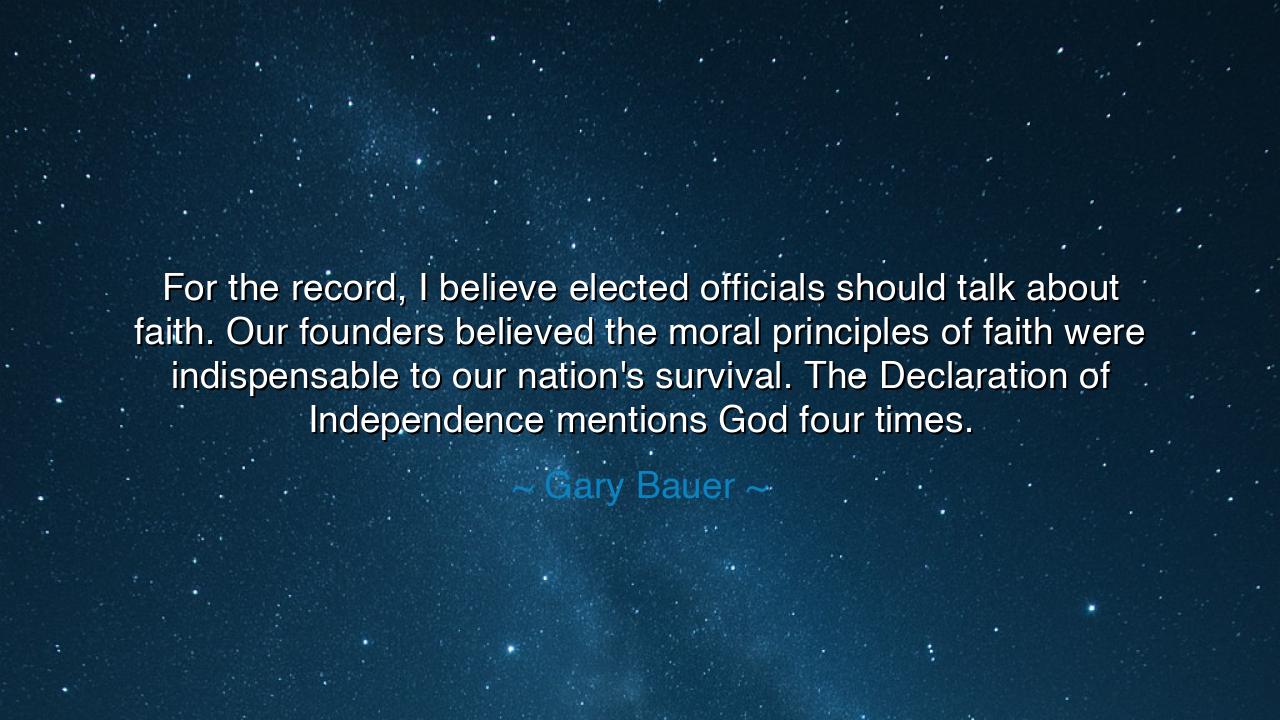
For the record, I believe elected officials should talk about
For the record, I believe elected officials should talk about faith. Our founders believed the moral principles of faith were indispensable to our nation's survival. The Declaration of Independence mentions God four times.






Listen, O children of the future, for the words of Gary Bauer carry a truth that resounds through the ages, echoing with the deep wisdom of the past. He declares, "For the record, I believe elected officials should talk about faith. Our founders believed the moral principles of faith were indispensable to our nation's survival. The Declaration of Independence mentions God four times." These words are not merely a political statement but a reflection on the very soul of a nation, and the moral foundation upon which it was built. Faith, as Bauer rightly points out, was not just a private matter for the founders—it was woven into the very fabric of America's identity, seen as the cornerstone of freedom, justice, and the moral integrity of the nation.
In the ancient world, the connection between faith and governance was understood by many great civilizations. Consider the Greeks, who, though often seen as rational and philosophical, still built their cities around the belief that the gods influenced their fates. Athens, that cradle of democracy, was a society that, while centered on reason, never lost sight of the divine forces that shaped their world. The Romans, too, were keenly aware of the importance of faith in their statecraft. The concept of Pax Deorum—the peace of the gods—was integral to their understanding of how the empire could thrive. They believed that faith and the favor of the gods were necessary for the stability of their nation, a principle that carried the empire through centuries of conquest and triumph.
Bauer’s words draw our attention to the fact that America, like these ancient civilizations, was founded not just on ideas of liberty and self-government, but on a moral foundation rooted in faith. The Declaration of Independence, penned by Thomas Jefferson in 1776, explicitly mentions God multiple times, reinforcing the belief that the rights of individuals were not merely the creation of government or man, but were granted by a higher power. The founders understood that the right to life, liberty, and the pursuit of happiness was not something that could be taken away by any earthly ruler—because these rights were God-given, inherent to every human being.
This belief was echoed by other leaders of the American Revolution, such as Patrick Henry, who famously declared, "Give me liberty, or give me death!" His words were not just a cry for political freedom, but a reflection of the faith he had in a divine purpose for his people. The very survival of the fledgling nation depended not just on the strength of its people but on the moral and spiritual convictions that guided their actions. Bauer reminds us that the founders saw faith as essential not just to personal salvation, but to the nation’s survival, its very moral compass, and its ability to endure.
The importance of faith in governance is not limited to America's founders. History shows us that the strength of a nation often hinges on the moral principles that guide its leaders. Take, for example, the Emperor Constantine in the Roman Empire, who, after his conversion to Christianity, declared that faith and virtue should guide the empire. His embrace of Christianity helped transform the Roman Empire, giving it a moral foundation that endured for centuries, even as the empire expanded and contracted. Much like Constantine, America's founders believed that a nation grounded in moral principles—guided by faith—would be strong, just, and free.
So, O children, the lesson from Bauer’s words is clear: faith is not merely a personal matter; it is the lifeblood of a nation. Faith provides the moral foundation upon which freedom, justice, and equality can flourish. Just as the ancient civilizations relied on the favor of the gods to guide their destinies, so too did the founders of America look to a higher power for the guidance of their nation. Faith was not seen as a hindrance to progress, but as a necessary pillar of a just and righteous society. To deny the role of faith in the governance of a nation is to strip it of the very values that make it strong and noble.
In your own lives, O children, never forget the importance of faith—not just in your personal beliefs, but in the moral foundation of the world around you. Stand firm in your convictions, for they are the bedrock of the choices you make and the world you will create. Just as America was built upon the idea that faith and freedom are inseparable, so too must you build your life on the principles of justice, honor, and integrity, guided by the wisdom of those who came before you. Seek not just the rights granted by society, but those granted by a higher power—those rights that affirm your human dignity and the sacredness of your existence. May you, like the founders of America, find strength in your faith and live by the moral principles that will guide you to a life of purpose and freedom.






AAdministratorAdministrator
Welcome, honored guests. Please leave a comment, we will respond soon